

BIS. BIS. I love BIS. Bâle 3. Publications. R_qt1309a_fr. 2013 Triennial Central Bank Survey of Foreign Exchange and Derivatives Market Activity. The Bank for International Settlements (BIS) announced today that in 2013 it will coordinate the ninth Triennial Central Bank Survey on Foreign Exchange and Derivatives Market Activity.
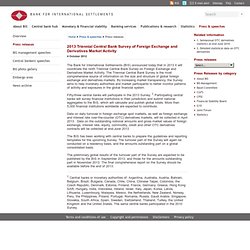
The Triennial Central Bank Survey is the most comprehensive source of information on the size and structure of global foreign exchange and derivatives markets. By increasing market transparency, the Survey aims to help monetary authorities and market participants to better monitor patterns of activity and exposures in the global financial system. Fifty-three central banks will participate in the 2013 Survey. 1 Participating central banks will survey financial institutions in their jurisdiction and submit national aggregates to the BIS, which will calculate and publish global totals. More than 5,000 financial institutions worldwide are expected to contribute.
Reassessing the impact of finance on growth. PDF // Reassessing the impact of finance on growth. Private Shareholders ? By Washington’s Blog As I've pointed out for years, the Bank for International Settlements (BIS) is owned by the world's central banks, which are in turn owned by the big banks.
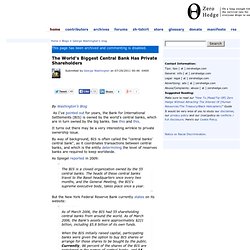
See this and this. It turns out there may be a very interesting wrinkle to private ownership issue. By way of background, BIS is often called the "central banks' central bank", as it coordinates transactions between central banks, and which is the entity determining the level of reserves banks are required to keep worldwide. As Spiegel reported in 2009: No more private shares. In the BIS's Tower of Babel, the shareholders are suing. Histoire. Carroll Quigley quotes about the BIS. La Banque des règlements internationaux (BRI) et la solution A l’origine de la plupart des propositions visant à sauver la « stabilité financière » comprenant la procédure inquiétante de bail-in, on retrouve, via le Conseil de stabilité financière, la Banque des règlements internationaux (BRI).
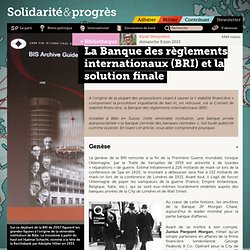
Installée à Bâle en Suisse, cette vénérable institution, une banque privée autoproclamée « la banque centrale des banques centrales », fuit toute publicité comme la peste. En lisant cet article, vous allez comprendre pourquoi. Genèse La genèse de la BRI remonte à la fin de la Première Guerre mondiale, lorsque l’Allemagne, par le Traité de Versailles de 1919 est astreinte à de lourdes « réparations » de guerre.
Estimé initialement à 226 milliards de mark-or lors de la conférence de Spa en 1920, le montant à débourser sera fixé à 132 milliards de mark-or lors de la conférence de Londres de 1921. En 1913, John Pierpont Morgan Jr. Au cœur de cette histoire, les ancêtres de la Banque JP Morgan Chase, aujourd’hui le leader mondial pour la partie banque d’affaires. BRI dans les documents diplomatiques suisses. The Bank for International Settlements (BIS) is an international organization of central banks.
The Bank for International Settlements (BIS) is an international financial institution[2] owned by central banks which "fosters international monetary and financial cooperation and serves as a bank for central banks".[3] The BIS carries out its work through its meetings, programmes and through the Basel Process – hosting international groups pursuing global financial stability and facilitating their interaction.
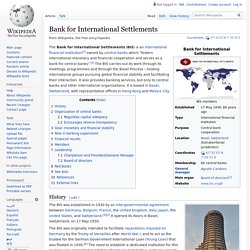
It also provides banking services, but only to central banks and other international organizations. It is based in Basel, Switzerland, with representative offices in Hong Kong and Mexico City. History[edit] BIS main building in Basel, Switzerland The BIS was established in 1930 by an intergovernmental agreement between Germany, Belgium, France, the United Kingdom, Italy, Japan, the United States, and Switzerland.[4][5] It opened its doors in Basel, Switzerland, on 17 May 1930. The BIS's original task of facilitating World War I reparation payments quickly became obsolete. Jaime Caruana. Jaime Caruana in 2008 Jaime Caruana (born 14 March 1952) is the General Manager of the Bank for International Settlements.
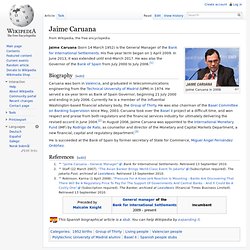
His five-year term began on 1 April 2009. In June 2013, it was extended until end-March 2017. The Basel Committee and the Global Banking Mafia. The Basel Committee on Banking Supervision (hereinafter – the Committee) is closely associated with supranational organisations like the Bank for International Settlements in Basel (BIS), which is often called the «club», the «headquarters» of central banks or the «Central Bank of Last Resort».
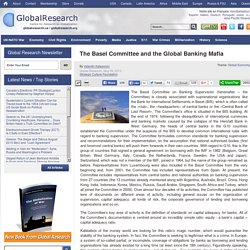
The Committee’s office is situated in the BIS building. At the end of 1974, following the disequilibrium of international currencies and banking markets caused by the collapse of the Herstatt Bank in West Germany, the heads of central banks in the G10 countries established the Committee under the auspices of the BIS to develop common international rules with regard to banking supervision. The Committee formulates common standards for banking supervision and recommendations for their implementation, on the assumption that national authorised bodies (first and foremost central banks) will push them forwards in their own countries. Basel I and Basel II – straws for the drowning 1. 2. 3. 4. Basel Banksters: Secretive elite group pulls strings of finance. Banque des règlements internationaux (BIR, BRI ou BIS)